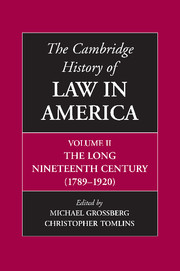Book contents
- Frontmatter
- 1 Law and the American State, from the Revolution to the Civil War: Institutional Growth and Structural Change
- 2 Legal Education and Legal Thought, 1790–1920
- 3 The Legal Profession: From the Revolution to the Civil War
- 4 The Courts, 1790–1920
- 5 Criminal Justice in the United States, 1790–1920: A Government of Laws or Men?
- 6 Citizenship And Immigration Law, 1800–1924: Resolutions Of Membership And Territory
- 7 Federal Policy, Western Movement, and Consequences for Indigenous People, 1790–1920
- 8 Marriage and Domestic Relations
- 9 Slavery, Anti-Slavery, and the Coming of the Civil War
- 10 The Civil War And Reconstruction
- 11 Law, Personhood, and Citizenship in the Long Nineteenth Century: the Borders of Belonging
- 12 Law in Popular Culture, 1790–1920: The People and the Law
- 13 Law and Religion, 1790–1920
- 14 Legal Innovation and Market Capitalism, 1790–1920
- 15 Innovations in Law and Technology, 1790–1920
- 16 The Laws of Industrial Organization, 1870–1920
- 17 The Military in American Legal History
- 18 The United States and International Affairs, 1789–1919
- 19 Politics, State-Building, and the Courts, 1870–1920
- Bibliographic Essays
- Notes on Contributors
- Index
- References
5 - Criminal Justice in the United States, 1790–1920: A Government of Laws or Men?
Published online by Cambridge University Press: 28 November 2008
- Frontmatter
- 1 Law and the American State, from the Revolution to the Civil War: Institutional Growth and Structural Change
- 2 Legal Education and Legal Thought, 1790–1920
- 3 The Legal Profession: From the Revolution to the Civil War
- 4 The Courts, 1790–1920
- 5 Criminal Justice in the United States, 1790–1920: A Government of Laws or Men?
- 6 Citizenship And Immigration Law, 1800–1924: Resolutions Of Membership And Territory
- 7 Federal Policy, Western Movement, and Consequences for Indigenous People, 1790–1920
- 8 Marriage and Domestic Relations
- 9 Slavery, Anti-Slavery, and the Coming of the Civil War
- 10 The Civil War And Reconstruction
- 11 Law, Personhood, and Citizenship in the Long Nineteenth Century: the Borders of Belonging
- 12 Law in Popular Culture, 1790–1920: The People and the Law
- 13 Law and Religion, 1790–1920
- 14 Legal Innovation and Market Capitalism, 1790–1920
- 15 Innovations in Law and Technology, 1790–1920
- 16 The Laws of Industrial Organization, 1870–1920
- 17 The Military in American Legal History
- 18 The United States and International Affairs, 1789–1919
- 19 Politics, State-Building, and the Courts, 1870–1920
- Bibliographic Essays
- Notes on Contributors
- Index
- References
Summary
Histories of modern criminal justice are less studies of doctrine than they are examinations of the state, since it is generally assumed that the institutions of criminal justice – police, courts, and prisons – play an integral role in the process by which modern states maintain the order that advanced capitalist economies demand. But while most accounts of criminal justice in the modern West trace the way a formal, rational system of criminal justice based on the rule of law developed alongside a capitalist economy and a national state, the history of criminal law in the United States follows a different track. Although the long nineteenth century, stretching from ratification of the Constitution at one end to the close of World War I at the other, was marked by the emergence of an advanced, nationwide capitalist economy, it saw the development neither of a national state nor a national system of criminal justice.
Even as they position the United States outside the standard track of state development, histories of criminal law in the United States still trace its evolution along a parallel route, demonstrating that over the course of the long nineteenth century the country developed a localized state. It differed from the traditional state to the extent its scope was smaller, encompassing only the institutions of city, county, and state governments, instead of a national bureaucracy, and its operations were, as a result, on a smaller scale. But many have argued that its smaller scale was its greatest strength.
- Type
- Chapter
- Information
- The Cambridge History of Law in America , pp. 133 - 167Publisher: Cambridge University PressPrint publication year: 2008
References
- 1
- Cited by



